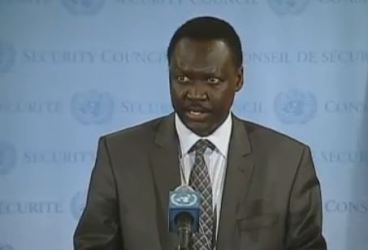South Sudan can only accept Ngok Dinka to chair Abyei parliament – diplomat
June 15, 2012 (WASHINGTON) — South Sudan will only accept the appointment of a Ngok Dinka as speaker of Abyei legislative body, said South Sudanese Ambassador to the United Nations on Thursday.

Khartoum refused the formation of the local government, which should be chaired by a SPLM appointed person, unless Juba accept the appointment of a speaker nominated by the Sudanese government as provided in a deal reached on 20 June 2011.
“South Sudan is prepared to accept a Ngok Dinka, member of the NCP (Khartoum’s ruling party) as head of this body but Sudan has only proposed a Misseriya candidate,” said Francis Nazario the newly appointed Permanent Representative of South Sudan to the United Nations.
Nazario went further to say that Khartoum’s position undermines “the prior understanding” the two parties reached on the issue.
The diplomat was alluding to a deal allegedly brokered by the Ethiopian Prime Minister, Meles Zenawi, according to what President Omer Al-Bashir accepted to appoint a Ngok Dinka in response to a request made by President Salva Kiir.
South Sudanese officials say Zinawi confirmed Bashir’s acceptance. But the mediation said it is not aware of such deal and they did not get a confirmation from the Ethiopian Prime Minister when he was asked about.
Zinawi did not comment on the row but he has certainly to explain himself with the two side as he is involved in the issue and his position will allow to clarify the issue.
Abyei population have to conduct a referendum on whether they want to join the South Sudan or remain part of the Sudan. However the two parties who claim the area diverge over who can participate in this vote.
President Bashir fired the former pro-SPLM administration because it had been suspected of preparing to proclaim unilaterally their decision to join the South Sudan. The attack on the Sudanese soldiers in May 2011 provided Khartoum with the opportunity to remove it.
Ethiopia has a 4200 strong force deployed in the area after the 20 June 2011 deal brokered by the African Union mediation team and upon a joint call by the two sides to the UN Security Council as they have to withdraw their troops from the flashpoint area.
Next Monday 18 June, the head of UN Interim Security Force for Abyei (UNISFA), General Tadesse Werede Tesfay, will brief the UN Security Council for the first time about the security situation and the performances of his force on the ground as displaced people started to arrive in the area.
Monday consultations meeting will discuss the steps the two parties have to take before the establishment of the Joint Border Verification and Monitoring Mechanism. The Council is expected to demand the two countries to enforce this mechanism without further delay.
The 15 member council previously urged Sudan to withdraw it oil police force from oil fields but Sudan says it is a Sudanese territory and not part of the disputed area of Abyei.
The Council is also is expected to support the position of the African Union expressed by the head of its commission, Jean Ping, who urged the parties to establish the buffer zone stressing its establishment does not mean to demarcate the border between the two countries.
Sudan and South Sudan refused a map prepared by the mediation team and proposed other own maps, rejected later by the two parties. However, the African Union panel chaired by Thabo Mbeki says South Sudan accepts now the proposed map.
South Sudan leader Salva Kiir previously told the African Union Peace and Security Council that if the talks over border demarcation fail they intend to resort to the international arbitration.
(ST)
